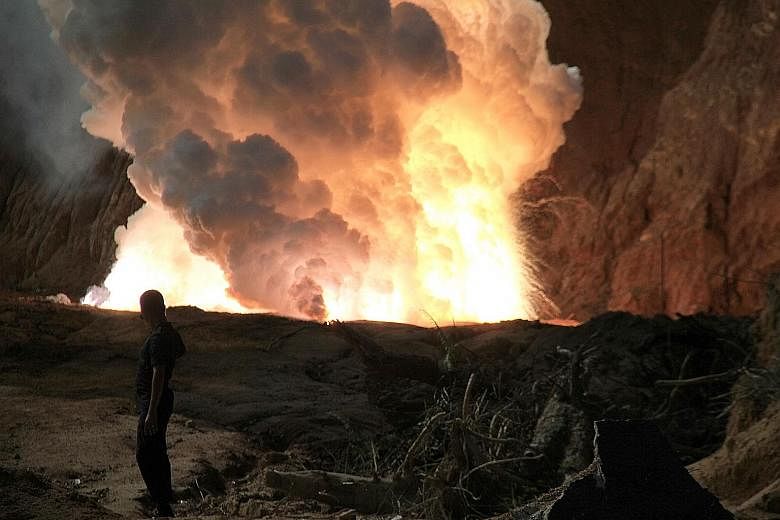Indonesian police have found 300kg of explosives and more than 15 bombs in the houses of an arrested terrorist and his accomplice in northern Sumatra.
The materials - which included a land mine, pipe bomb and vest bomb - were mostly found in the Sibolga home of local militant cell ring leader Husain alias Abu Hamzah, 30, whose wife blew herself up at the house with her two-year-old child early on Wednesday as their house was besieged by police.
One of the four land-mine bombs planted around the house yard went off on Tuesday, injuring a police officer, according to police spokesman Dedi Prasetyo.
"Husain had a sophisticated plan... He has high skills of bomb making. We found various types of switching: (to detonate the bombs by) movement, step-on, and remote device," Brigadier-General Dedi told a media briefing yesterday morning.
He did not elaborate on how the land-mine bomb was activated.
"The amount of explosives is quite high, meaning this required big enough financing. Our investigation is zooming in on who their financiers are," Brig-Gen Dedi added.
He said the couple had been planning a one-person attack strategy and a suicide bombing, indicated by a vest bomb that the police found in the house of Husain's accomplice, Ameng.
Part of Ameng's role was also to help finance the cell's operations, Brig-Gen Dedi said, pointing out that Ameng contributed 15 million rupiah (S$1,400).
Husain, Ameng and Ogel, the third person arrested in Sibolga, are believed to be members of Jamaah Ansharut Daulah, an Indonesian terror group affiliated with the Islamic State in Iraq and Syria (ISIS).
Separately, North Sumatra Police Chief Inspector-General Agus Andrianto said the woman who blew herself up was called Solimah.
Indonesian state news agency Antara reported that her body parts were found around 70m from the house that was besieged by police on Tuesday.
Neighbours of Husain said they noticed that he and his wife never went to a community mosque for prayer. They also understood that the couple had stricter views about Islam compared with other residents who practise a moderate form of the religion.
But neither Husain nor his wife had ever raised suspicion of terror activity, according to a report prepared by Jakarta-based Centre of Terrorism and Radicalism Studies (CTRS), whose researchers spoke to the couple's neighbours.
Originally from Sibolga, the self-trained electrician would help neighbours fix ceiling lights and replace wall light switches for a fee.
Husain and his wife had been away for years and came back to their home town only several years ago, local cleric Zainun told CTRS.
Husain's wife previously wore a burqa, but no longer did after they returned to Sibolga and lived in the house that was besieged by police on Tuesday, Mr Zainun said.
Yesterday, police said the couple had four children, identified by their initials: H aged 18, A aged 16, S aged 11, and H aged two. Police are now searching for the elder three. The youngest was killed in Wednesday's early morning blast.
Indonesian police began a major crackdown on militant networks early last year ahead of the Asian Games in Jakarta and Palembang, South Sumatra, in August and September, as well as the International Monetary Fund and World Bank annual meetings in Bali in October.
Figures show that Detachment 88 forces killed or detained 396 militants last year, a record number and a sharp jump from the 176 in 2017. Twenty-five suspects were gunned down during raids last year as they resisted arrest, nine more than in 2017.
Indonesia, which has the world's largest Muslim population, has long struggled with Islamic militancy.
A gun and suicide bomb attack in Jakarta in January 2016 left four attackers and four civilians dead. It was the first assault claimed by ISIS in South-east Asia.
Indonesia suffered its worst terrorist attack in 2002, when the bombings of two nightclubs on the resort island of Bali killed 202 people, mostly foreign tourists.

